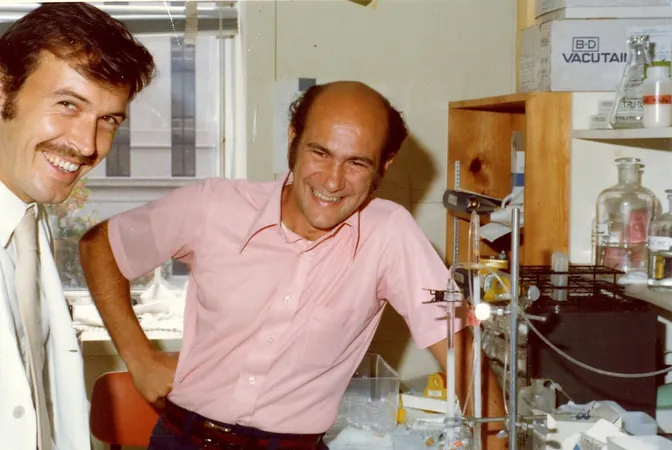
The Silent Legacy of Pedro Cuatrecasas: A Biochemist's Hidden Nobel Potential
2025-07-15
Author: Sarah
Meet the Unsung Hero of Modern Medicine
Pedro Cuatrecasas, a name that may not ring a bell for many, was on the brink of history as a potential third Spanish Nobel laureate in science. With a remarkable career that included the development of over 40 groundbreaking drugs, Cuatrecasas passed away at the age of 88 in La Jolla, California, leaving behind a monumental legacy that has largely gone unrecognized.
A Brilliant Mind in Troubling Times
Born on September 27, 1936, in Madrid during the Spanish Civil War, Cuatrecasas endured a tumultuous childhood. He was the son of José Cuatrecasas, a prominent scientist and Republican sympathizer, who fled to Colombia to escape political persecution. In 1947, the family relocated to the United States, where Pedro's passion for science blossomed.
Described as "absolutely brilliant" by 2003 Nobel Prize winner Peter Agre, Cuatrecasas' early training at the National Institutes of Health set the stage for his incredible contributions to biochemistry.
A Revolutionary Technique: Affinity Chromatography
At just 32, Cuatrecasas transformed biology with an ingenious innovation: affinity chromatography. This revolutionary technique simplified the purification of hormones, proteins, and DNA, leading to faster discoveries in biological research. His groundbreaking paper raised whispers in labs that he could be the next in line for a Nobel Prize.
A Quest for Rubric and Recognition
Despite his pivotal role, Cuatrecasas remained modest throughout his career. Many speculate that his lack of visibility and self-promotion may have hindered his chances for the Nobel accolade. His close collaborator, Meir Wilchek, noted that their shared accomplishments—while transformative—were overshadowed by the recognition of their supervisor.
Contributions Far Beyond the Lab
Cuatrecasas not only excelled in academia but also in the pharmaceutical industry. After switching gears in 1975, he played influential roles at prominent companies such as Burroughs Wellcome and Parke-Davis, contributing to the creation of life-saving medications including atorvastatin, known to be the best-selling drug globally.
A Legacy of Compassion and Curiosity
His innate curiosity fueled further discoveries, notably revealing insulin's mechanism of action. This insight is credited with launching modern endocrinology. His commitment to nurturing scientific culture paved the way for a generation of researchers who were empowered to innovate.
A Call for Recognition After His Passing
After Cuatrecasas' quiet death, fellow scientist Ignacio Vicente Sandoval urged the media to acknowledge his invaluable contributions. The underwhelming coverage of Cuatrecasas in both Spanish and American press highlights the irony of a man whose work profoundly touched countless lives yet remained unsung.
A True Scientist's Belief
Pedro Cuatrecasas viewed himself as both Spanish and American, cherishing his roots while thriving in the US scientific landscape. His dedication to medicine was always directed toward beneficial outcomes for humanity. His warnings against corporate greed in research echo his enduring vision of a science-led future.
The Legacy of a Life Uncelebrated
Cuatrecasas' life and work remind us of the incredible yet often unseen contributions that shape modern medicine. As history quietly turns the pages, it’s crucial to remember this biochemist whose discoveries have altered humanity’s course, urging us to recognize and celebrate the unsung heroes amongst us.


 Brasil (PT)
Brasil (PT)
 Canada (EN)
Canada (EN)
 Chile (ES)
Chile (ES)
 Česko (CS)
Česko (CS)
 대한민국 (KO)
대한민국 (KO)
 España (ES)
España (ES)
 France (FR)
France (FR)
 Hong Kong (EN)
Hong Kong (EN)
 Italia (IT)
Italia (IT)
 日本 (JA)
日本 (JA)
 Magyarország (HU)
Magyarország (HU)
 Norge (NO)
Norge (NO)
 Polska (PL)
Polska (PL)
 Schweiz (DE)
Schweiz (DE)
 Singapore (EN)
Singapore (EN)
 Sverige (SV)
Sverige (SV)
 Suomi (FI)
Suomi (FI)
 Türkiye (TR)
Türkiye (TR)
 الإمارات العربية المتحدة (AR)
الإمارات العربية المتحدة (AR)